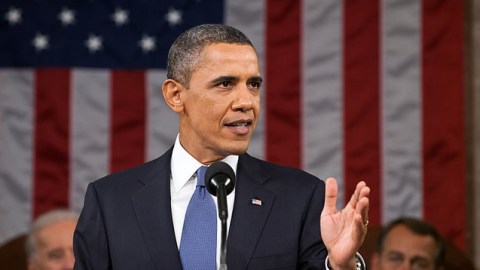Obama Makes the Case for Regulation

On Monday, President Obama gave a speech to the Chamber of Commerce. After the Chamber’s support of Republicans in the midterm elections, Obama appeared to be extending the olive branch to the business group. And, to an extent, he was. The Chamber may back his opponent in 2012—and remains opposed to many of Obama’s priorities—but in the meantime both sides would like to work with the other.
But those who read the speech closely pointed out that it Obama had hardly gone to the Chamber as part of a corporate apology tour. As Digby says, Obama certainly didn’t go as far as FDR had when he announced the Second New Deal in 1936. In that speech, FDR compared the business community to “an organized mob” that treats the government as “a mere appendage to their affairs,” and said that he “welcomes their hatred.” But if Obama didn’t go as far as FDR, neither did he back down from the regulatory approach the Chamber opposes.
As Jed Lewison says, Obama used the speech to make a case that business leaders have a stake in closing the growing gap between the rich and the middle class in America. Obama argued that in the long run it is in the business community’s interest to make sure that everyone—and not just CEOs and stockholders—benefits from American prosperity:
Even as we eliminate burdensome regulations, America’s businesses have a responsibility as well to recognize that there are some basic safeguards, some basic standards that are necessary to protect the American people from harm or exploitation. Not every regulation is bad. Not every regulation is burdensome on business. A lot of the regulations that are out there are things that all of us welcome in our lives.
Few of us would want to live in a society without rules that keep our air and water clean; that give consumers the confidence to do everything from investing in financial markets to buying groceries. And the fact is, when standards like these have been proposed in the past, opponents have often warned that they would be an assault on business and free enterprise. We can look at the history in this country. Early drug companies argued the bill creating the FDA would “practically destroy the sale of… remedies in the United States.” That didn’t happen. Auto executives predicted that having to install seatbelts would bring the downfall of their industry. It didn’t happen. The President of the American Bar Association denounced child labor laws as “a communistic effort to nationalize children.” That’s a quote.
In its response, the Chamber stressed that most regulations are unnecessary, but didn’t really contest Obama’s point. The AFL-CIO, meanwhile, was pleased that Obama had challenged the business group. House Majority Leader Eric Cantor (R-VA), on the other hand, said he would tell Obama that businesses don’t have any such “responsibility” to the government or the country.
What the proper relationship between government and business should be is one of genuine substantive differences between the two parties, and will be one of the key issues in American politics for years to come. While there certainly plenty of burdensome and unnecessary regulations, Obama makes an important point. The largely unregulated capitalism of the 19th century meant terrible conditions for many ordinary Americans and was a source of social unrest that threatened to bring down our economic and political system. As Karl Polanyi famously argued in The Great Transformation, it was probably in part the kinds of regulations Obama mentions that kept communism or fascism from taking root in the U.S. the way they did elsewhere around the world. Polanyi wrote that the stability of Western capitalism is predicated on the idea that economic success cannot be at the expense of ordinary citizens. That there was, in effect, a kind of compact between business and labor, an agreement to at least partly share the benefits of economic growth. And while regulations—like child labor laws or workplace safety rules—impose a real ongoing cost on business, they are also precisely what makes our economic system sustainable and ensures that all Americans can participate in American prosperity.
Photo credit: Pete Souza



